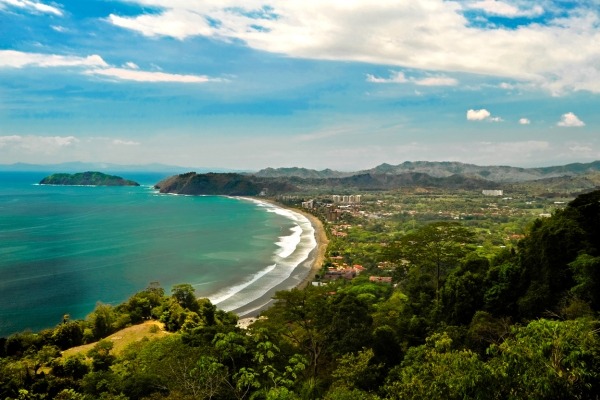

Are You Thinking About Investing In Costa Rica’s Maritime Land Zone? This What You Need To Know. We Made It Simple
by Quatro Legal Real Estate Team | Jan. 3, 2024 | Article, Real Estate

Some of our clients have a certain fear or do not feel comfortable buying concession property due to all the information or misinformation they read online, especially because the process is drastically different from buying titled property. However, if understood correctly and under the right real estate lawyer’s assistance, it should not be a reason for real estate investment not to be completed, if it is the property that checks all the boxes.
According to Law 6043, the maritime land zone is defined as the 200-meter strip of land along the shoreline. It is subject to a special legal regime. With a few exceptions, property in this zone cannot be privately owned or transferred in fee simple and remains property of the State.
Of this 200-meter strip, the first 50 meters measured from high tide (a technical reference), called the public zone, is destined for public use, and all appropriation and construction activities and developments are banned. The purpose of this area is for walking and free transit. The remaining 150 meters, called the restricted zone, are subject to concession.
Who administers the maritime land zone? The Municipality where the property is located, and the Costa Rican Tourism Board (ICT) are responsible for administrating these areas.
Can these properties be used and exploited by private parties? Land located in the maritime land zone is owned by the State (administered by the corresponding Municipality) and so the only legal mechanism by which a person or entity can use and exploit these areas is by obtaining a concession agreement.
In areas declared to have tourism value by the ICT (which are most of the coastal area), Municipalities can only grant concessions if there is an approved zoning plan.
Can maritime land zone rights by concession be inherited? Yes. For the heirs to become concessionaires, they will have to comply with the maritime land zone act, the concession agreement and any other legal or technical aspects that apply or have been assigned to the concession.
For how long are maritime land zone concessions granted? For no less than five years and no more than 20. However, the term can be renewed for consecutive periods as long as: 1) the concession abides by the applicable regulations and contractual clauses; and 2) the request is filed prior to the expiration date.
What happens if the Municipality decides not to renew a concession? The rule is simple: if the concession is not renewed due to nonperformance of the concessionaires’ contractual and legal obligations, then the Municipality has the right to refuse to compensate the former concessionaire for any improvement or construction made on the property.
If the decision is made because the Municipality requires the concession for a justified public interest, then the Municipality must compensate the concessionaire for all improvements made to the property and all legal constructions that are built. An appraiser will determine the value of these improvements.
Do concessions expire? Yes. Concessions can expire due to: a) the term of the concession agreement ending and the concessionaire not processing the renewal on time; b) the concessionaire abandoning the property; c) the concessionaire dying and having no heirs; and d) the concession being canceled.
How might a concession be canceled? Concessions might be canceled if: a) the concessionaire fails to pay the taxes on time; b) the concessionaire does not comply with the concession agreement; c) the concessionaire is unable to comply with the maritime land zone law; d) the concessionaire decides to build or conduct activities in the public zone; and e) any other specific grounds established by law.
Can foreign nationals be awarded concessions for property located in the maritime land zone? Yes, but only under certain conditions. Unlike fee simple properties, titles on maritime land zone land are not owned, but rather held by concession. Also, foreign nationals do not have the same rights as citizens when it comes to the maritime land zone.
Law 6043 establishes that foreign citizens cannot be majority concessionaires by themselves or as part of a company that “owns” these lands. However, there are methods employed to comply with the restrictions on foreign “ownership.”
The recommended legal structure used to comply with the foreign restriction is to create a trust where a domestic entity owned by a Costa Rican is named as trustee. In this case, the trustee holds 100% of the stock in trust for the benefit of the foreign owner(s) during the term of the concession. The trustee’s powers are limited to custody of the stock and general administration of the permit according to the foreign owner’s written instructions.
Is it possible to be a concessionaire of more than one concession? There is a legal void on this matter. The law establishes a restriction of one concession per person but does not make mention of corporations. It is very common for a corporation to hold one or more concessions.
How easy is it to apply for a concession? In terms of the law, it is a fast and straightforward procedure. In practice, however, it takes between three and five years due to municipal bureaucracy. The wait is generally worthwhile since maritime land zone properties are a good investment given their prime location.
The concession request culminates in a concession agreement executed between the interested party and the mayor of the corresponding Municipality. This agreement states the terms under which the concession is granted.
The concession beneficiary must always comply with the agreement, which states the specifics of the concession such as: the area given by concession, the type of activity that can be carried out based on the zoning plan, the specifics of the construction (density, height, floor number, etc.), the time frame in which the owners to develop the activity to comply with the concession, etc.
Can concessions be transferred to third parties? Even though, from a legal perspective, the asset belongs to the State, and one cannot sell or transfer an asset to which the seller has no ownership rights, transactions of maritime land zone properties are common and quite sought after, as concession properties are as beautiful and useful as titled property.
The most common method is to execute a private sale agreement of the seller’s concession rights. However, every change must be formally notified to the Municipality, which must approve of the change. (The Municipality will only verify that the new owner complies with the conditions set forth to hold a concession). Failure to comply with this requirement could result in cancellation of the concession.
Any new concessionaire must comply with the conditions established in Law 6043 and with the terms of the concession agreement.
Can you change the terms of the concession agreement? This will depend on the specific case. Several factors are taken into consideration to determine feasibility. In general, if the concession has not been developed and the new activity complies with the zoning plan and the land use certificate (Uso de Suelo), it could be possible to change the terms of the concession.
Does the concessionaire have free reign to build on the concession? No. As with any other type of property in Costa Rica, the Municipality has final consent and approval based on the applicable zoning plan and the land use certificate (Uso de Suelo).
How much are property taxes on a concession? The Municipalities charge an annual tax that must be paid in January (“Canon” in Spanish) and that is a percentage of the appraised value of the property as determined by the Tax Authority. The appraisal is part of the concession request and is established in the concession agreement.
The tax is calculated on the appraised value and is a legal percentage based on the property’s land use certificate (Uso de Suelo): a) Agricultural use: up to 2%; b) Residential use: up to 3%; c) Hotel, tourism or recreational activities: up to 4%; and d) Commercial, industrial or mining up to 5%.
Can concession property be subject to profitable economic activities? Yes. The activity will be determined based on the concession’s characteristics.
Can a private third party hold a concession property as an investment and not develop it? From a legal perspective, no. In general terms, all concession agreements establish the term in which the concessionaire must develop and carry out the agreed activity. Failure to comply with these terms could be interpreted by the Municipality as a breach of the concession agreement resulting in the concession’s cancellation.
There are plenty of non-developed concessions, however, partly because some Municipalities do not have the resources to verify that the concession agreement is being upheld. Another common reason is that the concessionaire cannot develop the activity due to external factors, such as the lack of water, roads, boundary issues, etc. In these cases, the Municipality is not permitted to cancel the concession.
Is it safe to invest in concession property? Generally, yes. However, it is extremely important to understand under what terms the concession was or will be granted to ensure that the new concessionaire is in compliance or to determine the feasibility of changing the terms based on the potential buyer’s interest.
If the concession and its concessionaire are in good standing, it is safe to invest in a concession.
These are sought-after properties, as they tend to be very lucrative due to their prime location and unblocked ocean views.
For more information please fill out the courtesy e-meeting form at the bottom. We will be glad to assist you!
Disclaimer: The information provided in this blog post is for general informational purposes only and is not intended to constitute legal advice. While we strive to ensure the accuracy and timeliness of the content, laws and regulations are subject to change. For the most accurate and up-to-date information, please contact our office directly. Some images may be AI generated.
Get To Know Quatro Legal

We’re bringing empathy and excellence back to legal counseling. Quatro Legal is built on a bedrock of kindness, a passion for service, and a commitment to guiding you through your legal challenges with ease.
OUR SERVICES
EXPLORE BY
category
REAL
ESTATE
CORPORATE
COSTA RICA
LIFESTYLE
LABOR & EMPLOYMENT
CLIENT
TESTIMONIALS
FREE TRADE
REGIME
All Rights Reserved 2023 | Privacy











